Grant gives gift of equine therapy to those with disabilities
Thirteen years after the unfortunate death of actor Christopher Reeve, a group of Tennesseans with disabilities are benefitting from his legacy. Shelby Residential and Vocational Services Inc. (SRVS), Tennessee’s largest provider of services for people with intellectual and developmental disabilities, has received a $5,950 Quality of Life Grant from the Christopher and Dana Reeve Foundation to increase equine therapy access for people supported by SRVS, which is based in Memphis.
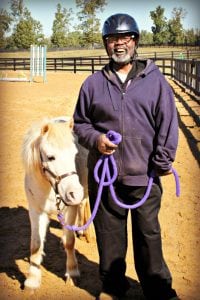
With the funding, 12 to 15 individuals at SRVS (pronounced “serves”) can regularly participate in equine therapy during two 10-week sessions through SRVS’s collaboration with Southern Reins Center for Equine Therapy in Nesbit, Mississippi.
According to Anthony Hicks, director of public relations for SRVS, the partnership with Southern Reins began prior to the receipt of the Reeve Foundation grant, but that money has allowed SRVS to augment the relationship. The grant was one of 102 given to nonprofit organizations nationwide that provide more opportunities and access and improve daily quality of life for individuals living with paralysis, their families and caregivers.
Patsy Wilson, a registered nurse and director of health services for SRVS, says there are proven benefits with motor, emotional and sensory sensations that come with riding a horse.
“This is not a typical environment for the people we serve,” Wilson says. “In addition to the physical therapeutic value, it gives the people we support a new experience in the world around them.”
Other benefits of the therapy are improved posture and trunk strength, according to Wilson. People who are not riding receive benefits from the barn therapy experience. Caring for the horses promotes independence and immersion into their surroundings.
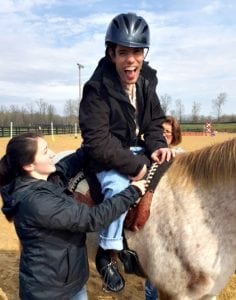
Jill Haag, executive director of Southern Reins, says her organization is honored to partner with SRVS to enhance the lives of individuals with disabilities. When the partnership between the two organizations began, only a handful of participants were taking part in equine-assisted learning through ground activities with the horses. The partnership has grown since that time due to the success of the program and improved socialization and communication SRVS clients experienced while at the farm and after they returned to their group homes.
“Through this partnership with SRVS and the funding from the Reeve Foundation, we are able to expand our program services and can now provide therapeutic riding to the clients of SRVS where they had previously only participated in our ground horsemanship program,” Haag says. “This adds a new and exciting opportunity for SRVS participants to learn how to ride and control a 1,100-pound animal. Our goal is to teach riding skills that are challenging and fun with physical and cognitive objectives for each participant to achieve.”
Those who witness the reactions of recipients of equine therapy say it’s transformative.
“I tell everybody at SRVS that this is where the magic happens because in every single lesson, we are watching miracles take place,” says Astrid French, SRVS quality improvement manager, as she records participants’ progress at the Southern Reins facility. French helped establish the relationship between SRVS and Southern Reins.
The riding lessons not only strengthen the bodies of participants, many of whom have cerebral palsy and other conditions that affect their mobility. They also provide participants with additional community outings and opportunities for socialization by exposing them to an array of volunteers each week, teaching new skills, improving fitness goals, bolstering confidence and bestowing a sense of joy.
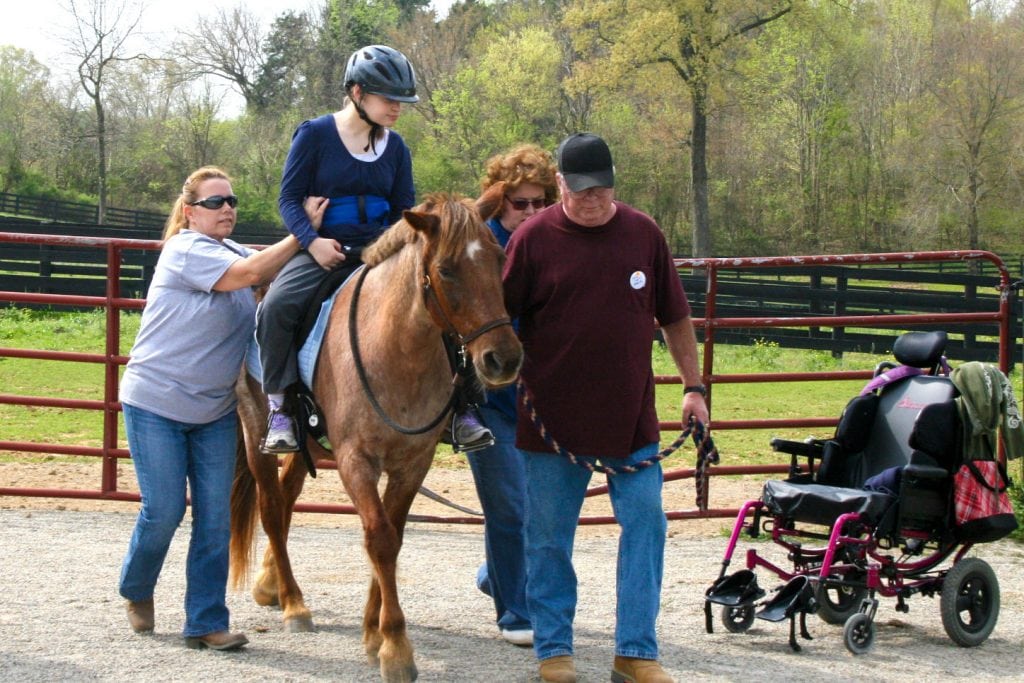
“In people who have tactile aversion (increased sensitivity to touch), the desire to get back on the horse is stronger than the aversion by the very next lesson,” French says. “People who have weakened torsos and use wheelchairs are getting on the horses and staying erect first for 20 minutes and then 30 minutes the next time. When you see their excitement to get on the horse and they’re saying, ‘I want horse, open the gate,’ they are using verbalizations we’ve never heard before. And we see people who are nonverbal laughing and smiling, and we’ve never seen that before. It is incredible.”
“Along with the program’s therapeutic value,” Hicks says, “a rewarding part of seeing it in motion is the amazing sense of accomplishment and fulfillment I’ve seen among the participants as they interact with the horses during therapy sessions.”
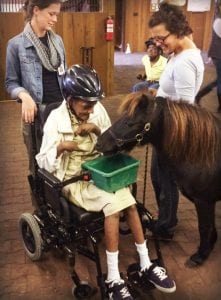
The equine therapy doesn’t just help the disabled participants, however. Haag points out that the people in the participants’ lives benefit as well.
“For families and caregivers, the opportunity to see their participants take part in a program where their success is the focus and where disabilities disappear on the backs of our horses, it’s just miraculous,” she says. “Recreational activities are often limited for people with disabilities, so to provide such an empowering and inspirational opportunity for them to shine in the ring and develop as riders is simply incredible.”
Carolyn Brown has nothing but praise for the program, saying that it has had a profound effect on the life of her son, Parker.
“Southern Reins has been a game-changer for our family and is one of the highlights of Parker’s week,” Brown says. “It is the point of reference by which all other days are measured: ‘How many moons until I get to go back?’ Parker believes that riding his horse friend fuels his superpowers for the upcoming week! He gets to feel big and in control and can go fast. It is the one time during the week that he is unleashed from all of his emotional issues. For one glorious hour, Parker gets to feel typical … and in that same hour, Mom gets a glimpse of heaven.”
The positive effect the grant from the Reeve Foundation is having on SRVS clients is part of a wonderful legacy left by the man who appropriately played Superman and his devoted wife. The foundation, which is dedicated to curing spinal cord injuries by funding innovative research and improving the quality of life for people living with paralysis, has awarded more than 2,900 grants totaling more than $20 million since 1999. Funding for the grants is made available through the Paralysis Resource Center operated by the Reeve Foundation under a cooperative agreement with the Administration for Community Living in the U.S. Department of Health and Human Services.
For the people benefiting from these grants, perhaps Christopher Reeve himself said it best: “So many of our dreams at first seem impossible, then they seem improbable, and then, when we summon the will, they soon become inevitable.”
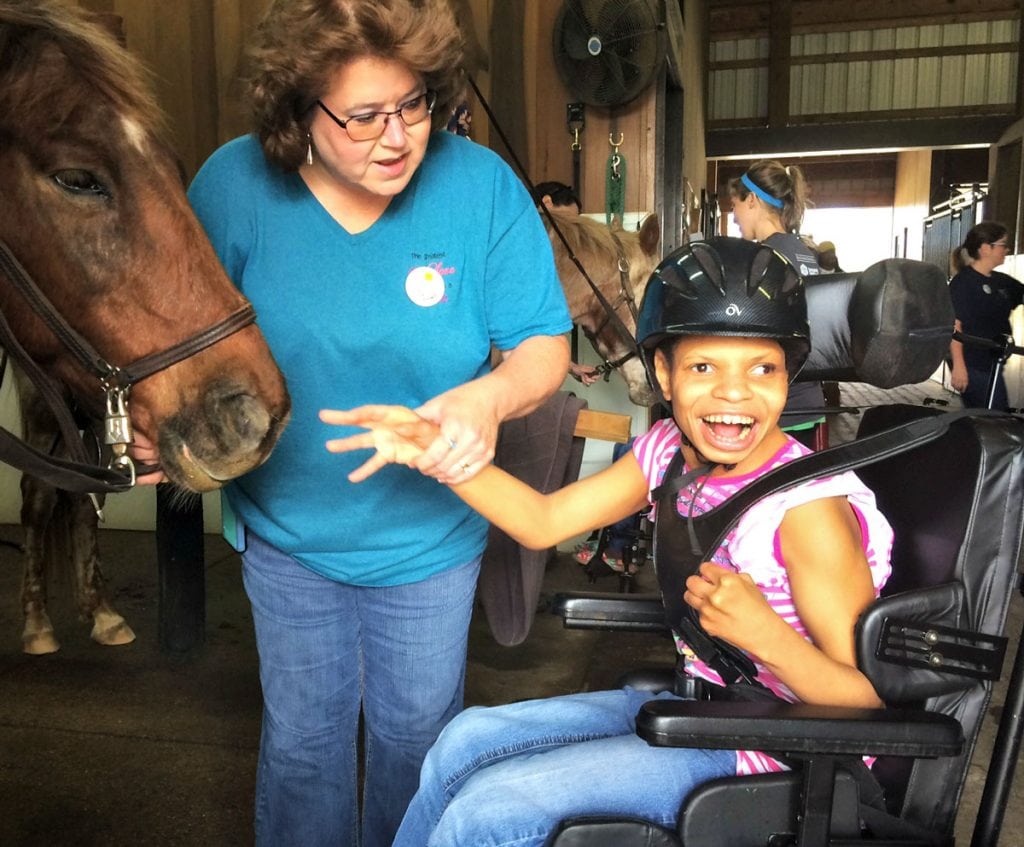
Take the reins and find out more
Shelby Residential and Vocational Services:
srvs.org
901-869-7787
Southern Reins:
southernreins.org
901-290-1011
Southern Reins also serves children and adults with disabilities such as Down syndrome, autism, multiple sclerosis, traumatic brain injury, amputation, ADD and more. The Equine Services for Heroes program works with military veterans and first-responders who have been injured during their service.
Christopher and Dana Reeve Foundation:
christopherreeve.org



